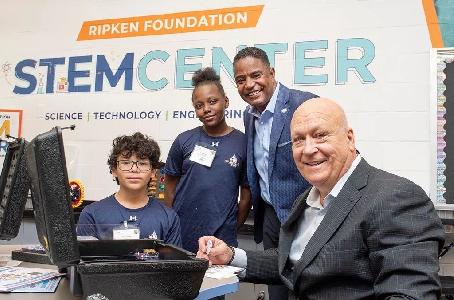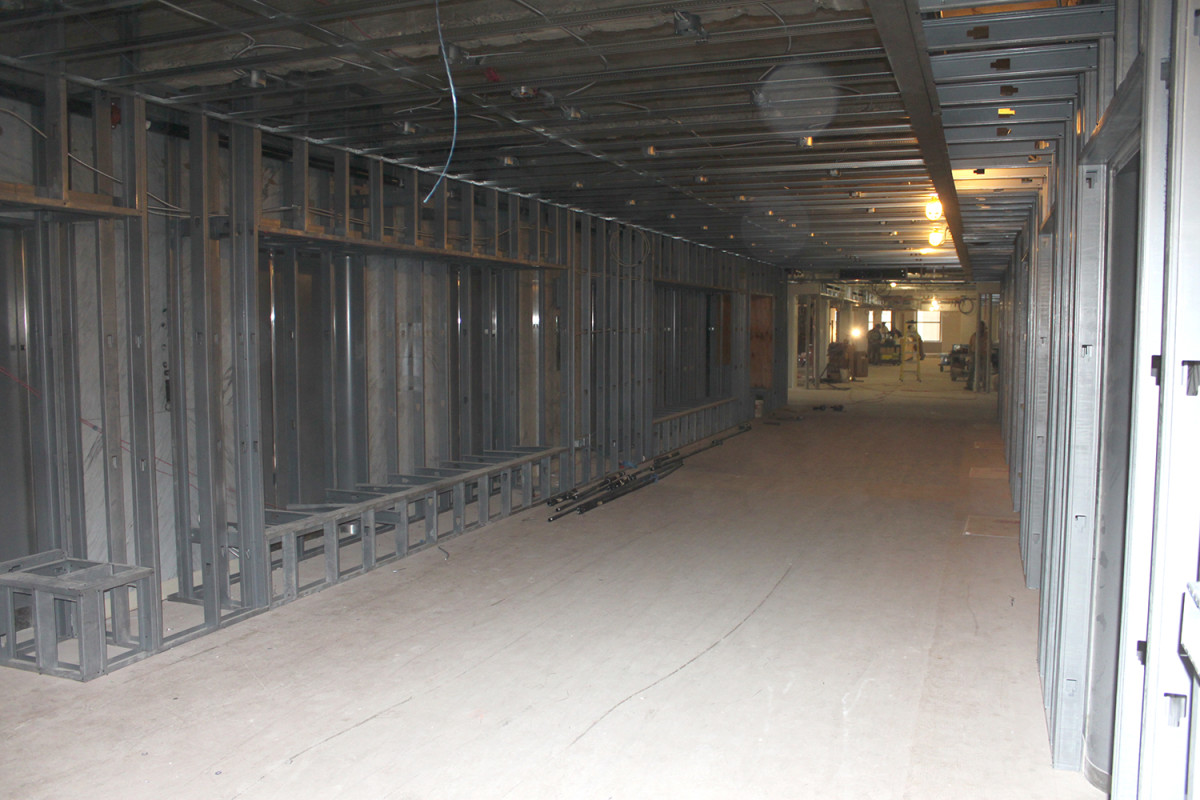On a Friday afternoon in June, Staq cofounders James Curran and Mike Subelsky turned over the giant scissors to Greg Cangialosi. Sporting a Staq T-shirt, the tech community leader cut the ribbon on the adtech startup’s new offices.
Located on the fourth floor of a building above 8 Market Place, the ceremony was held one story above a space where DreamIt Health’s Baltimore accelerator program helped six health-focused startups over the winter.
It was a short walk from Cangialosi’s office just a couple of buildings over at MissionTix, the online ticket seller where he has served as CEO for the last two years. For about four years, MissionTix and parent company Mission Media were the only tech-focused businesses in the immediate vicinity.
That has since changed.
Traditionally, Power Plant Live! has really only catered to the happy hour and nightlife crowd, so it's good to begin to see more of a mix of activity happening all day long.
While leaving Staq, this reporter ran into two of the company’s new neighbors: Noah and Nate Weiner, cofounders of health IT startup Avhana Health. Dressed in button-downs and khakis and carrying work bags, the brothers looked a little out of place amid vendors preparing for that evening’s edition of The Gathering food truck rally.
The nightlife typically associated with Power Plant Live! is crossing paths with the startups that are beginning to populate the downtown area.
“Traditionally, Power Plant Live! has really only catered to the happy hour and nightlife crowd, so it’s good to begin to see more of a mix of activity happening all day long,” said Cangialosi.
As Jason Hardebeck, another tech community leader, put it, “Most people had no idea there was an office building back there.”
At least in the Power Plant, that change can be partially traced to the Cordish Companies. The Baltimore-based development firm that owns plenty of splashy real estate, including Power Plant Live!, has office space in the buildings around the entertainment complex. Recently, they were hearing from smaller companies, and began designing space that’s geared toward startups.
“What we learned is that when these companies started finding us, we started to notice a trend in what they were looking for,” said Cordish Development Director Alex Fine.
The two floors of 8 Market Place have open workspace and shorter-term leases. In the fall, Cordish is opening more offices and coworking space to the third floor, where DreamIt Health was located over the winter. Called Spark, the 20,000-square-foot space will have a craft beer bar and fitness room amid offices and suites, along with larger shared areas for meetings and events that are designed to foster collaboration. Being close to restaurants and nightlife doesn’t hurt either, and Cordish can even offer parking.

Inside a Power Plant Live! building is Spark, a new coworking space that has housed the DreamIt Baltimore startup accelerator program. (Photo by Stephen Babcock)
Central location
But beyond the amenities, startup founders Technical.ly Baltimore asked also said they appreciated the location.
Avhana’s Nate Weiner said he appreciated the chance to be in the middle of things.
“One of my favorite methods of management is walking meetings and I love the ability to walk by the harbor,” he said. “Being downtown also made it easy for our employees since it is centrally located compared to all the different places they live all over the city.”
We wanted a place that we could easily partner with other firms and a central place for commerce.
Subelsky, the Staq cofounder, called it “inspiring” to be in an area with a lot of business activity.
“I’m meeting with very different people from other industries now, on a regular basis, just by being central,” Subelsky said.
Delali Dzirasa, president of Fearless Solutions and an advisor to Cordish on Spark, cited proximity to both CyberPoint and Chick-fil-A as benefits.
“We wanted a place that we could easily partner with other firms and a central place for commerce, and Spark and downtown Baltimore provide both,” he said.
American Technology Services was drawn into the fold. The Fairfax, Va.-based IT services firm has been around since 1994, but just opened an office in Baltimore in the high-rise at 250 W. Pratt St.
CEO Jeff Chandler said the company mainly works with government contractors and foundations. Baltimore represented a chance to connect with new clients in distribution and light manufacturing, as well as tap into an attractive workforce.
When he was scouting locations with a commercial real estate broker, Chandler said he looked at Canton, as well as suburban locations like Towson and Reistertown.
Ultimately, the firm settled on a location downtown because of its proximity to transportation like the interstates and MARC train.
“We need to be able to get to prospective clients easily,” Chandler said.
For all of the plaudits and seemingly natural fits, however, the city’s central business district is something of a new frontier for tech startups.
Growth of the tech community has mostly centered around Southeast Baltimore, where the Emerging Technology Centers (ETC) incubator has been located (whether in Canton or its current Highlandtown space) since 1999, and South Baltimore, where Betamore is located in Federal Hill.
“It’s going to be interesting to see the flip-flops bump into the suits,” said ETC President Deb Tillett.
A little help
Larger Baltimore-based tech companies like R2integrated and CyberPoint have headquarters on West Pratt Street, but downtown remained relatively unpopulated by startups even as areas like the Bromo District on the western portion of the neighborhood appeared to call out for the kind of “revitalization” that tech communities often bring.
“Our sense that we’d gotten over the last couple years from tech in Baltimore was that people weren’t gravitating toward the central core,” said Caroline Peri, director of economic development at the Downtown Partnership of Baltimore.
So when it comes time for the companies to picture themselves in this more staid area, the Downtown Partnership provides help. In the fall of 2014, the organization announced the TechConnect program, which provides grants of up to $10,000 to companies that agree to move into the central business district area for at least a year.
The program has given grants to six startups so far, all of which are planning to take office space in the 8 Market Place building. Along with money, Peri, Downtown Partnership Director of Economic Development Mackenzie Paull and other staff also help the companies locate space and navigate a commercial real estate process they typically haven’t had experience in.
DreamIt Health, the first grant recipient, became a big catalyst. Incubators tend to have an anchoring effect.
Kevin Keenahan of health IT firm Tissue Analytics said TechConnect essentially coordinated the company’s entire move from Johns Hopkins’ FastForward East incubator in East Baltimore, which the wound-care company quickly outgrew. Avhana Health’s Nate Weiner called the program “invaluable.”
“TechConnect was able to help us identify the different office spaces available in the city and even helped arrange tours,” Weiner said. The only prior real estate experience Weiner had was coworking during DreamIt Health.
When it comes to Baltimore really being able to take the next step in the maturation process, we'll know that'll happen once our downtown is thriving.
The combination of TechConnect and the Cordish space has also attracted companies into the city limits from Baltimore County. Fearless Solutions and cybersecurity company PaRaBaL are moving from UMBC’s research park and incubator, respectively, while another cyber company, Deep Run Security, relocated from Owings Mills.
Peri said the program has enough money to help two more startups, and a lot of office space that’s been identified beyond Power Plant Live! While Cordish appears to have created an inviting spot, whether the rest of downtown will become a tech hub remains an open question.
Enough momentum?
Advocates for the area like the Downtown Partnership have heard many complaints. Office space is too expensive, they’re told. There’s a lack of parking. They also acknowledge the lack of retail around the area in general. And then there’s the perception that it’s a place for suits who work in banking or finance.
But vacant space remains, and that may be near the top of important factors at this point. When preparing to launch TechConnect, Peri and Paull set out to find available space that would be ideal for startups. They found some surprises, like an area on the 12th floor of the American Building that they didn’t know about before.
“It took getting inside the buildings to find out who had different types of space,” Peri said.
In the past, startups may not have considered downtown because it didn’t have the kind of space they were considering (think open floor plans, collaboration space, kitchen amenities, etc.). Now that Baltimore startups are growing up, that’s changing.
With Spark, Cordish is targeting startups that are ready to graduate from incubators like ETC and Betamore (which are both currently at or near capacity anyway). The speed with which the space is filling up shows there are plenty of local companies prepared to make that jump, officials say.
“I think what it shows is that demand outstrips supply,” tech executive Hardebeck said.
The focus on tech isn’t an accident, as it’s considered one of the fastest growing sectors of the economy in the city. If a downtown tech community ultimately blossoms, that will likely be good for Baltimore as a whole.
“When it comes to Baltimore really being able to take the next step in the maturation process, we’ll know that’ll happen once our downtown is thriving,” Fine said.
Join the conversation!
Find news, events, jobs and people who share your interests on Technical.ly's open community Slack

Baltimore daily roundup: The city's new esports lab; a conference in Wilmington; GBC reports $4B of economic activity

Baltimore daily roundup: Find your next coworking space; sea turtle legislation; Dali raided and sued

Baltimore daily roundup: Johns Hopkins dedicates The Pava Center; Q1's VC outlook; Cal Ripken inaugurates youth STEM center



